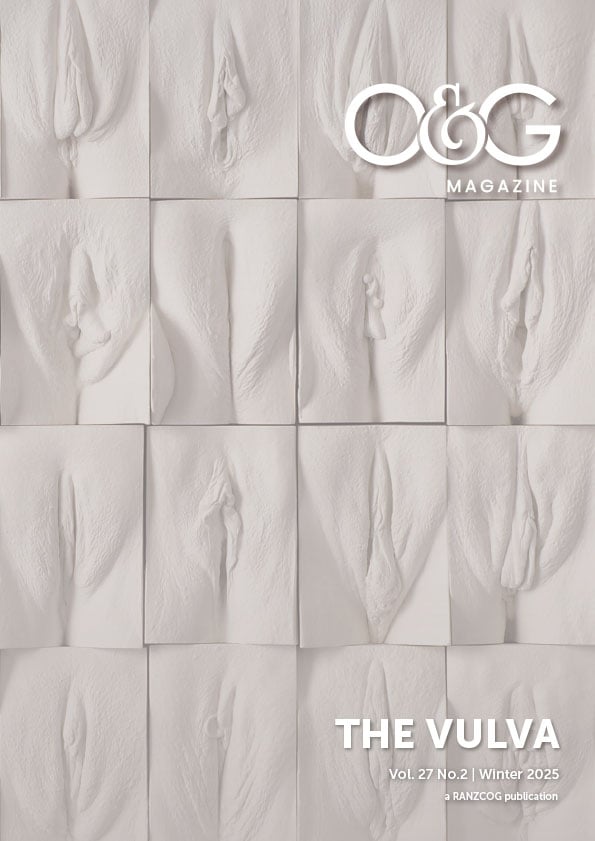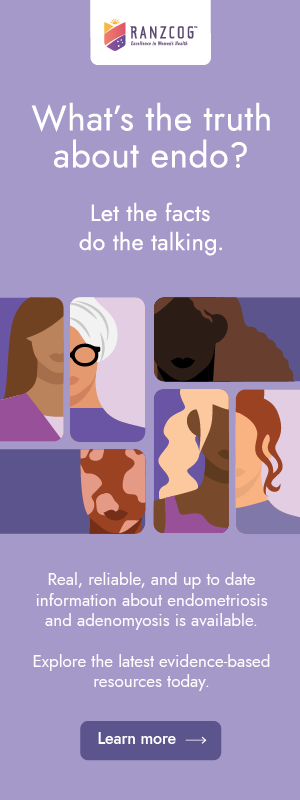Acknowledging the theme of this issue, current RANZCOG clinical guidance statements and guidelines that help inform the topic of the vulva include:
The first half of 2025 has seen the publication of two significant pieces of work for the Research and Policy Team; the Australian Living Evidence Guideline: Endometriosis, and the Miscarriage, Recurrent Miscarriage and Ectopic Pregnancy Clinical Guideline (C-Gyn 38).
The Australian Living Evidence Guideline: Endometriosis updates the 2021 RANZCOG Endometriosis clinical practice guideline (the Foundation Guideline). In 2022, the Australian Government invited RANZCOG to update the Foundation Guideline and transition it into a living evidence format (Living Guideline). The Living Guideline builds on the Foundation Guideline and integrates the latest research. The use of living evidence enables clinical guidelines to respond to emerging evidence relevant to the Australian context and highlight areas where there is either low certainty or absent evidence to signal where further research is needed. A dissemination and implementation plan, for both primary and secondary care, has also been developed to support this important work.
The Miscarriage, Recurrent Miscarriage, and Ectopic Pregnancy Clinical Guideline (C-Gyn 38) is RANZCOG’s first clinical guideline focused on early pregnancy loss. Developed by a multidisciplinary Guideline Development Group chaired by Dr Kasia Siwicki, this comprehensive guideline offers evidence-based recommendations and clinical guidance to registered health professionals in Australia and Aotearoa New Zealand providing care to women with suspected or confirmed early pregnancy loss.
Topics addressed include:
- Treatment options for incomplete and missed miscarriage
- Progesterone treatment for bleeding in early pregnancy, and for recurrent miscarriage
- Recurrent miscarriage, including screening tests
- Diagnosis and management of tubal ectopic pregnancy
- Management of non-tubal ectopic pregnancy (including interstitial, cervical, and caesarean scar ectopic pregnancies)
- Rh(D) Immunoglobulin (Anti-D)
In the remainder of 2025, the Research and Policy Team will continue or commence work covering other important areas, including:
- Intrapartum fetal surveillance (C-Obs 1) (anticipated 2025)
- Birth after caesarean (C-Obs 38) (anticipated 2025)
- Vasa praevia (C-Obs 47) (anticipated 2025)
- Menopause (C-Gyn 9) (anticipated 2026)
- Robotic Surgery in Gynaecology (C-Gyn 29) (anticipated 2026)
The Research and Policy Team and Women’s Health Committee would like to thank all Guideline Development Group Chairs and members for their valued work. Opportunities to contribute to guideline development and provide feedback on draft work are advertised in Connect. Visit the Statements and Guidelines Directory on the RANZCOG website to access our clinical guidance documents.

RANZCOG’s Endometriosis Research and Development Group

RANZCOG’s Endometriosis Research and Development team. Left to right: Kate Smith, Magda Bofill, Professor Cindy Farquhar, Marian Showell






Leave a Reply